
1. Don't look down: Ben Bernanke fears that the American economy will soon look like a Looney Tunes episode.
The former Federal Reserve chief questions the wisdom of Congress for waiting until the economy looked healthy and then hitting the gas with massive corporate tax cuts and a burst of spending.
"What you're getting is stimulus at the very wrong moment," Bernanke said last week at an event hosted by the American Enterprise Institute.
He's got a point. The unemployment rate is 3.8%, matching the lowest in half a century. Stimulating the economy further could overheat it, ending the recovery prematurely. And by expanding the federal deficit, Congress has left itself less room to borrow money to fight the next recession.
The other challenge is avoiding a nasty crash when the sugar rush fades from tax cuts.
"It's going to hit the economy in a big way this year and next," Bernanke said. "And then in 2020, Wile E. Coyote is going to go off the cliff and look down."
Of course, it's difficult to forecast that far out. And investors will recall that Bernanke famously said in March 2007 that the impact of the subprime mortgage collapse was "likely to be contained." The Great Recession began nine months later.
Related: Storm clouds are gathering over the global economy
For now, Wall Street doesn't seem worried about a recession. Powered by blockbuster earnings, the Nasdaq raced back to a record high last week. The Dow and S&P 500 have recovered most of their losses from last winter's sell-off.
Still, Bernanke's warning underlines Washington's peculiar sense of timing. Congress hit the brakes on the economy by cutting spending and letting tax cuts expire during the fiscal cliff standoff in 2013 — just as the slow-speed recovery needed a boost.
"I begged Congress," Bernanke said, "not to raise taxes and cut spending as they did. It was the wrong time to do that."
This Congress is making life more difficult for Jerome Powell, the current chairman of the Fed. The central bank, which meets on Wednesday, needs to keep inflation in check by raising interest rates, but not so quickly that it exacerbates a potential slowdown.
That's not to mention the deep uncertainty and higher expenses for businesses caused by President Trump's tariffs and trade threats.
Lindsay Piegza, chief economist at Stifel, told CNNMoney's "Markets Now" last week that she already sees signs that economic momentum is "beginning to wane."
"The risk of recession rapidly rises as we look out to the second half of 2019 and into 2020," she said.
2. AT&T-Time Warner decision: A federal judge is expected to rule Tuesday on the fate of AT&T's $85 billion bid to acquire Time Warner.
The Justice Department sued to block the deal. It argues that the combination would give AT&T (T) the power to charge its competitors more for Time Warner's content, or to block the content entirely from the likes of Comcast, Verizon and Charter.
Time Warner owns HBO, Warner Bros. and the Turner networks, including CNN. AT&T and Time Warner say they need to join forces to compete with new competitors such as Netflix (NFLX) and Amazon (AMZN). AT&T has argued that prices would not necessarily go up, and that it would have no reason to keep its content from competitors.
Related: AT&T calls on more expert witnesses to undermine DOJ's antitrust lawsuit
3. Rate hike coming: The Federal Reserve is expected to raise interest rates this week for the second time this year. Fed Chairman Jerome Powell will take questions on Wednesday after the announcement.
Investors will be listening for clues about whether the Fed will raise rates once more this year or twice.
The markets will also be eager to hear what Powell says about trade and the economic risk from President Trump's tariffs.
Related: How much longer can the US economy keep rolling?
4. Tariff details: By Friday, the Trump administration is expected to release the final list of Chinese products that will be subject to tariffs — about $50 billion in all. The White House says the tariffs will take effect "shortly thereafter."
The United States reached a deal last week with ZTE, a Chinese tech company, and lifted a ban that blocked the company from buying American parts. The deal drew backlash, but some experts think the Trump administration was trying to win goodwill in trade negotiations with China.
Related: Trump's on-again, off-again strategy on China may backfire
5. Coming this week:
Monday — Net neutrality ends
Tuesday — H&R Block (HRB) earnings; AT&T-Time Warner decision
Wednesday — Fed interest rate decision and Powell press conference
Thursday — US retail sales for May
Friday — Deadline for White House to publish tariff list


